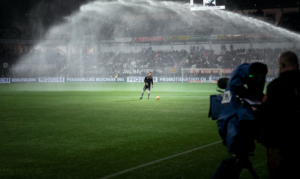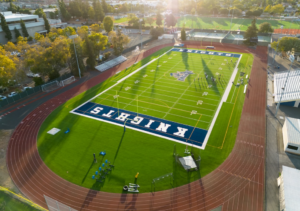In today’s world, managing a sports facility requires more than just a simple love for games. It needs a keen understanding of various administrative tasks and planning, an extraordinary ability to manage resources, and the capacity to anticipate and swiftly respond to potential problems. Good sports facility management is crucial in creating a positive and productive environment for all stakeholders. It’s why many managers prefer to undertake graduate sports management programs to continue their professional growth. Keep reading to learn vital aspects of sports facility management.
Overview of Sports Facility Management
Sports facility management involves a multitude of duties that guarantee the efficient functioning of the sports facility. This includes everything from planning sporting events and scheduling games to maintaining the grounds, sports court marking, and MUGA pitch size and dimensions.
Understanding and participating in the daily operations on and off the field is a core aspect of sports facility management. This allows the manager to maintain the quality of service provided to athletes, spectators, and sponsors.
Part of sports facility management covers fiscal aspects too. Budgeting and financial planning are essential in maintaining and upgrading the facility infrastructure with services from muga construction buckinghamshire and providing sports services.
Incorporating Technology in Sports Facility Management
Embracing technology has immense potential to transform sports facility management, leading to increased efficiency and productivity.
Advanced scheduling software can streamline the booking process and simplify facility management operations. Digital marketing platforms can be utilized to promote upcoming events or to amplify fan engagement and communication.
Technological breakthroughs have also resulted in the development of sophisticated network monitoring software. These systems can automatically check and regulate variables like temperature and humidity in indoor facilities.
Therefore, incorporating technology in sports facility management has become an almost non-negotiable aspect for the modern sports facility manager.
Essential Leadership Skills for Managing a Sports Facility
The sports facility manager, as a leader, requires critical soft skills of communication, decision-making, and problem-solving to successfully manage the facility.
Communication skills ensure that the manager can effectively articulate goals, provide clear instructions, and foster an environment of trust among the staff. Furthermore, good interpersonal skills are essential in building strong relationships with sponsors and community leaders.
Decision-making under pressure is a trait that all sports facility managers should possess. This involves making tough calls and balancing the needs of athletes, staff, and sponsors.
Lastly, problem-solving skills help the manager in analyzing situations, identifying root causes, and implementing effective solutions. Therefore, leadership skills are the cornerstone of sports facility management.
Implementing Effective Scheduling and Event Management
One of the primary tasks of sports facility managers is scheduling events and ensuring their smooth execution.
Scheduling involves allocating spaces for different games, booking facilities for local and international matches, and arranging for adequate personnel.
Event management extends to taking care of transportation, accommodation for players and officials, and managing ticket sales and entrance for spectators.
Successful event management helps to seal the reputation of a sports facility and can attract high-profile events or sponsorships in the future.
Importance of Regular Maintenance and Safety Protocols
The maintenance and upkeep of the sports facility is a crucial part of its management. Regular maintenance ensures the facility’s longevity and reduces long-term financial costs. According to Tennis Court Contractors, tennis courts only require resurfacing once or twice a decade. A little cleanliness also goes a long way toward preserving it and minimizing the need for significant repairs.
As part of regular maintenance, it’s essential to inspect the playing surfaces, gym equipment, and surrounding areas. This includes checking for any wear and tear on the floors that may require a new macadam surface construction project. If you’re searching for professional help, consider looking for experts specializing in epoxy floors near me to ensure top-notch repairs or replacements as needed.
Safety protocols, on the other hand, ensure the well-being of the athletes, staff, and spectators. Regular drills, emergency action plans, and safety training sessions for staff members are vital.
By managing maintenance and safety properly, sports facility managers contribute towards a safer and more efficient sporting environment. This involves regular inspections, repairs, and upgrades to various components within the facilities. Ensuring the quality and condition of specific areas, such as the tennis courts, is equally crucial. Investment in initiatives like tennis court refurbishment from https://www.tenniscourtmaintenance.co/ helps sustain the playing surface, ensuring a safe and high-quality area for players to enjoy their sport while reducing the risk of injuries and optimizing performance.
Overall, managing a sports facility is a complex but rewarding task that requires an understanding of diverse areas, from leadership skills, and event management to maintenance and technology. Each aspect contributes to the smooth functioning and overall growth of the sports facility.









